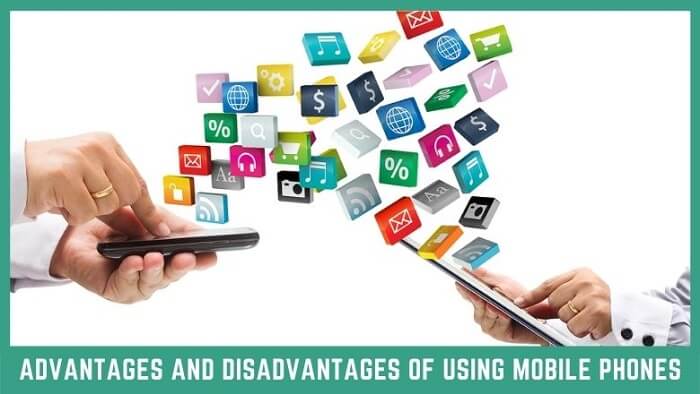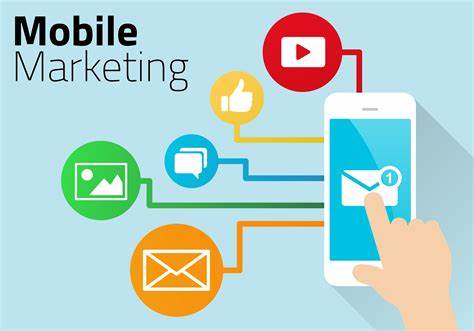Advantages and Disadvantages of Mobile MarketingDefinition of Mobile Marketing:A multi-channel internet marketing strategy known as "mobile marketing" tries to reach a target audience through websites, email, SMS and MMS, social media, mobile applications, and other connected devices like smartphones, feature phones, tablets, and other similar devices. Customer-specific, time- and location-sensitive information that promotes products, services, appointment reminders, and ideas can be given to customers using mobile marketing. Academic A more theoretical definition of mobile marketing is given by Andreas Kaplan, who describes it as "any marketing action conducted over a ubiquitous network to which consumers are continuously connected using a personal mobile device." 
Mobile marketing is advertising that promotes products and services using portable electronic devices like smartphones and tablets. It's an excellent way to connect with clients constantly on the road. Mobile marketing strategies include using texting, applications, and the mobile web. When compared to conventional types of marketing, mobile marketing has many advantages. Active targeting clients, for instance, works exceptionally effectively. Mobile marketing uses a variety of channels, including mobile websites, mobile apps, MMS messaging, SMS messaging, and others. Advantages of Mobile Marketing
Compared to conventional PCs and laptops, smartphones and tablets are less expensive, more compact, and more portable. As a result, barriers related to money, location, or technology no longer prevent people from being online who couldn't before.
Our cell phones are always with us. We never leave home without them, just as we never do with our wallets or keys. Additionally, most of the time, our mobile phone is turned on, allowing us to receive messages as soon as they are sent. Mobile marketing strategies can help you spread your message right away.
Designing components for desktops or laptops is easier and less expensive than designing components for mobile devices. The distribution of promotions and reward services for marketing to us, the users, is also made simpler by this medium. To earn a discount, for instance, we can download a coupon to our phone, show it to the cashier, and do so without using the internet. As soon as we need it, we can retain this knowledge close to hand. 
The content displayed on a mobile phone is constrained by its small screen size. This is advantageous for content producers because they can keep their work straightforward and straightforward. Additionally, simpler content will adapt to the various mobile platforms better.
Data collection about users is efficient with mobile marketing. Since many people typically keep their phone numbers longer than their email addresses, they work better as unique IDs in databases than email addresses. Near-instantaneous user response tracking is possible. This aids the mobile advertiser in developing buyer personas and better understanding and analyzing user behavior.
The domino effect is present here. Mobile marketing increases the likelihood of virality, or a piece of content - typically a video - "going viral," due to the ease with which users can share mobile content. Good information and offers will be shared by users with their friends and family, giving businesses much more exposure with little extra work.
Because many more people own mobile phones than computers or laptops, mobile marketing enables marketers to access a larger and more varied audience via SMS or push notifications. The benefit of targetability is another benefit of mobile marketing. To reach the right audience, you can demographically target by using age and gender data, or geo-target by sending location-specific messages to individuals using GPS and Bluetooth technologies.
The power of influence has been placed in the hands of regular people thanks to social media platforms like Instagram and Twitter. Whether or not you know of it, you influence your friends and family on social media. Everyone has the potential to be an influencer, from mothers to fashion bloggers to individuals who merely enjoy seeing images of dogs eating.
The most recent mobile payment option is very practical for users today. Users are provided with a secure online payment environment that utilizes cutting-edge mobile Web systems in this location. The user can now make mobile purchases and make online bill payments without having to pay with physical money every time.
Ad personalization-targeted advertising that can be modified to speak specifically to one person based on factors like purchase history and location-is made easier. You can contact individuals with mobile marketing whenever available, whether at work, at home, or even on vacation. (We often discourage the last one.) And thanks to users' smartphones, a lot of data about their preferences can be gathered using location-based marketing. Disadvantages of Mobile Marketing:
In contrast to PCs and laptops, mobile devices do not adhere to specific standards. The size of a mobile phone's screen varies due to the wide variety of shapes and sizes available. Mobile platforms use a variety of browsers and operating systems as well. Therefore, developing a single campaign for each may require time and effort.
On any network or device, this is constantly in doubt. Smart mobile marketers must be aware of and respectful of users' desire for privacy. Therefore, if the user wants to opt out of receiving marketing communications, they should provide simple instructions.
Everything is based on first impressions. Sadly, the initial impression that your advertisements provide to viewers will be the one that matters the most. So make sure your advertisement or content is clear of errors. Due to the speed of mobile advertising, it might take a lot of work to correct an error before it is noticed.
This reinforces the first drawback. Remember how we advised you to "let it go viral"? Well, subpar advertisements or content may go viral just as readily as superior ones. Make sure your advertisement won't be seen negatively by giving it a thorough examination, possibly with the help of several people.
When creating mobile ads, keep the following in mind: Around 20% of users use regular cell phones in the United States, where about 80% of mobile phone ownership is made up of smartphones. Despite the user's potential interest in your advertisement, some users might need help accessing it.
Despite the commercials for limitless data, only some have access to such a service. This is a drawback that should be considered. Be aware that some people who see your advertisements may be subject to standard data and messaging fees. Given the benefits listed above, it is clear that mobile marketing is becoming more and more popular. Because consumers are increasingly using their mobile devices, mobile marketing is essential for an expanding brand. Therefore, get in touch with us immediately if you have not previously optimized your mobile website or consider how your online marketing approach should take into account users of smartphones.
Since mobile marketing is one of the more recent marketing strategies available, there is little study or expertise with the platform. Although there is a tonne of information on mobile marketing, it is still a relatively unexplored field, and we're only now starting to realize its full potential. Some firms might believe-and they might be right-that mobile marketing lacks nearly enough security or stability. The ground is a little shaky because the platform constantly evolves and changes. You might avoid mobile for the time being if your budget doesn't allow you to take many marketing risks.
Depending on your mobile marketing approach, it might be challenging and expensive to develop. For instance, developing a smartphone app is different from developing a website and may necessitate hiring a professional app developer, which is a significant expenditure. Creating an app that will be so helpful to your users that it succeeds in bringing in a lot more business is challenging. The creation of apps for mobile marketing, in particular, has the potential to take up a lot of your time and money.
If there is one certain thing, it is that each user's smartphone is unique. The ability to sort through messages at any moment is not available on a person's smartphone, unlike their email inbox. Numerous forms of mobile marketing, especially SMS marketing campaigns and push notification-using apps, can be quite intrusive. This is also what can make mobile marketing so successful when it does, but it also has the greatest potential to irritate and alienate potential clients. Making sure you have a user's consent before sending them messages or push alerts is the main privacy problem.
The device's size used to deliver your message is one of the main issues with mobile marketing. Anything you design for people to engage with or views, such as a mobile website or app, must be scaled for ease of viewing and navigating on a smartphone. Additionally, there are several variations in the sizes and shapes of mobile devices. It would help if you considered the possibility that some people will be viewing your content on a tablet or a more square than rectangle-shaped screen, for instance. The design and aesthetics should also be taken into account. Usually, users can view and interact with your content as you intended. The Conclusion:Your app installation rate can be significantly raised by mobile marketing. To find the best strategy for boosting app installs, a mobile marketing campaign needs to be well-thought-out and backed by a wealth of experience. It will be necessary for you to have a holistic understanding of the area. |
 For Videos Join Our Youtube Channel: Join Now
For Videos Join Our Youtube Channel: Join Now
Feedback
- Send your Feedback to [email protected]
Help Others, Please Share










